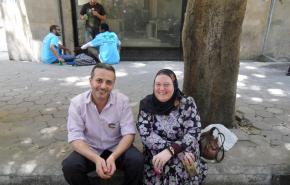Conversation on a Cairo street
A delegation of solidarity activists from the U.S. is bringing desperately needed humanitarian supplies to the Palestinians of Gaza. The convoy was organized by the group Viva Palestina, led by British Member of Parliament and antiwar activist George Galloway.
The delegation has met one obstacle after another in Egypt, where it assembled to gather the supplies and prepare for the crossing into Gaza. Egyptian authorities continued to delay the convoy for several days, only reaching an agreement late Tuesday night that the convoy could leave the next morning for Gaza.
Several SocialistWorker.org contributors are part of the Viva Palestina delegation and will be contributing to this journal. This entry was written by .
WHILE A number of us stood on a relatively empty Cairo street, a woman began chatting with members of our delegation. They were such wonderful people. Let me introduce you to them.
Annette is originally from a small town near Portland, Maine in the U.S. Abdullah is Egyptian and runs his own small business making saddles by hand for Arabian horses. They both live together in a town one hour north of Cairo, on the road to Alexandria.
As we explained to them why 90 Americans in blue shirts with the words "Viva Palestina" were wandering around the streets of Cairo at 11 a.m. on a Tuesday, their eyes lit up. We talked for over 20 minutes about Gaza, the reaction of the world, the Egyptian government's treatment of our convoy, and the U.S. role in Israel's occupation and oppression of the Palestinians.
Despite years of aggression and unilateral belligerence from the U.S. government, both were very hopeful that Obama would change all that. Annette told a story of when she first arrived a few years ago--there were numerous warnings from the U.S. embassy for Americans to be careful walking the streets in Cairo for fear of harassment or other things, due to how much Bush had angered the Arab and Muslim world.

Abdullah pointed out that there was never any physical danger, but it was very uncomfortable for Americans given our government's posture and no visible signs that people in the U.S. were opposing it in big numbers. However, since Obama was elected, the situation has changed dramatically, and people are willing to ask Annette about America, and are encouraged by the signs of a change in attitude.
Annette has been telling Abdullah for years that Americans do care about Arabs and Muslims in the Middle East and that many do oppose what Israel is doing to the Palestinians. Abdullah was not convinced this was true until he met us. High-profile cases of harassment, imprisonment and racism displayed by some people and government agencies in the U.S. have made a big impact on people in Egypt.
Abdullah had just gotten his visa to visit the U.S. and both were planning a visit back to Annette's home, her first in a few years--for Abdullah, it would be the first time ever visiting the U.S.
"For a while, I was a bit nervous about America, about being Arab and walking around," Abdullah said. "But now that I've met you and seen what your group is doing, I feel much, much better." And he cracked a big smile.
Solidarity activists traveled from the U.S. to Gaza to deliver desperately needed humanitarian aid to the Palestinian victims of Israel's brutal war. SocialistWorker.org writers contributed to this journal during the Viva Palestina convoy.Convoy to Gaza
Let the convoy through to Gaza
Stopped at the “Peace” Bridge
Navigating Egypt’s obstacles
It’s time the siege was lifted
Conversation on a Cairo street
A day in Gaza
The stories of life under siege
The irony of all this was that the reason we were on this street in the first place was our delegation needed an affidavit from the U.S. consulate--one the Egyptian government said was not required just two weeks ago, but suddenly became necessary as we were ready to head to the border. It took us three hours to process 80 individuals, and cost each person $30 to get their little sealed-and-signed piece of paper that says the U.S. is not liable to save us or do anything if anything happens to us in Gaza.
Here we were, two Americans, two Egyptians, both in support of Palestine, both gaining an understanding of how our worlds can connect and work together--all while the American and Egyptian governments are supporting the occupation of Gaza and delaying and trying to stop our convoy from connecting with the people of Gaza.
I took a statement from unofficial Ambassador Abdullah as a message from Egypt to our convoy: "Seeing you all, a big group of Americans, caring so much about Gaza and the Palestinians, it makes me so happy. Thank you, thank you." This is the Egyptian reception we will talk about back in the United States.


